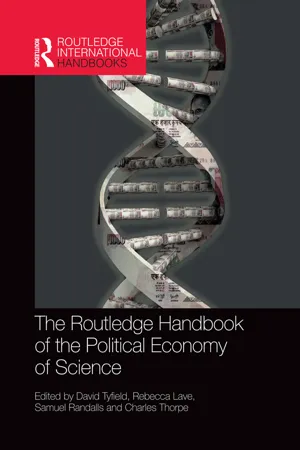
The Routledge Handbook of the Political Economy of Science
- 464 pages
- English
- ePUB (mobile friendly)
- Available on iOS & Android
The Routledge Handbook of the Political Economy of Science
About This Book
The political economy of research and innovation (R&I) is one of the central issues of the early twenty-first century. 'Science' and 'innovation' are increasingly tasked with driving and reshaping a troubled global economy while also tackling multiple, overlapping global challenges, such as climate change or food security, global pandemics or energy security. But responding to these demands is made more complicated because R&I themselves are changing. Today, new global patterns of R&I are transforming the very structures, institutions and processes of science and innovation, and with it their claims about desirable futures. Our understanding of R&I needs to change accordingly.
Responding to this new urgency and uncertainty, this handbook presents a pioneering selection of the growing body of literature that has emerged in recent years at the intersection of science and technology studies and political economy. The central task for this research has been to expose important but consequential misconceptions about the political economy of R&I and to build more insightful approaches. This volume therefore explores the complex interrelations between R&I (both in general and in specific fields) and political economies across a number of key dimensions from health to environment, and universities to the military.
The Routledge Handbook of the Political Economy of Science offers a unique collection of texts across a range of issues in this burgeoning and important field from a global selection of top scholars. The handbook is essential reading for students interested in the political economy of science, technology and innovation. It also presents succinct and insightful summaries of the state of the art for more advanced scholars.
Frequently asked questions
Table of contents
- Cover
- Title
- Copyright
- CONTENTS
- List of figures
- List of tables
- List of contributors
- Introduction: beyond crisis in the knowledge economy
- PART I From the ‘economics of science’ to the ‘political economy of research and innovation’
- PART II Institutions of science and science funding
- PART III Fields of science
- PART IV Governing science and governing through science
- PART V (Political economic) geographies of science
- Index